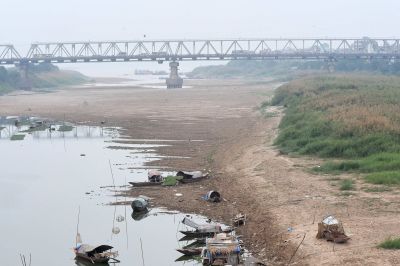Vietnam says parched Red River at record low

The Red River that divides Hanoi is at its lowest level in more than a century, and global warming could be a factor, a Vietnamese official said on Thursday.
"The level of the Red River was measured at only 0.66 metres (2.2 feet) on Tuesday morning, the lowest level in more than 100 years," said Le Thanh Hai, deputy director of the National Centre for Hydro-Meteorological Forecasting.
Vietnam is particularly vulnerable to the effects of climate change, the United Nations says.
The drying out of the Red River, spanned by several bridges, has left fishing boats stranded and exposed much of the river bed.
"There isn't yet clear scientific proof to say that this phenomenon is linked to climate change but I think there is a link between the two," Hai told AFP.
He blamed the low water levels on the year's short rainy season, warming because of the El Nino weather effect, and construction of hydro-electric projects on rivers in southern China and northern Vietnam.
"I think that the dryness which is hitting several rivers in northern provinces of Vietnam could continue at least until March or April 2010," Hai said.
Join our commenting forum
Join thought-provoking conversations, follow other Independent readers and see their replies
Comments